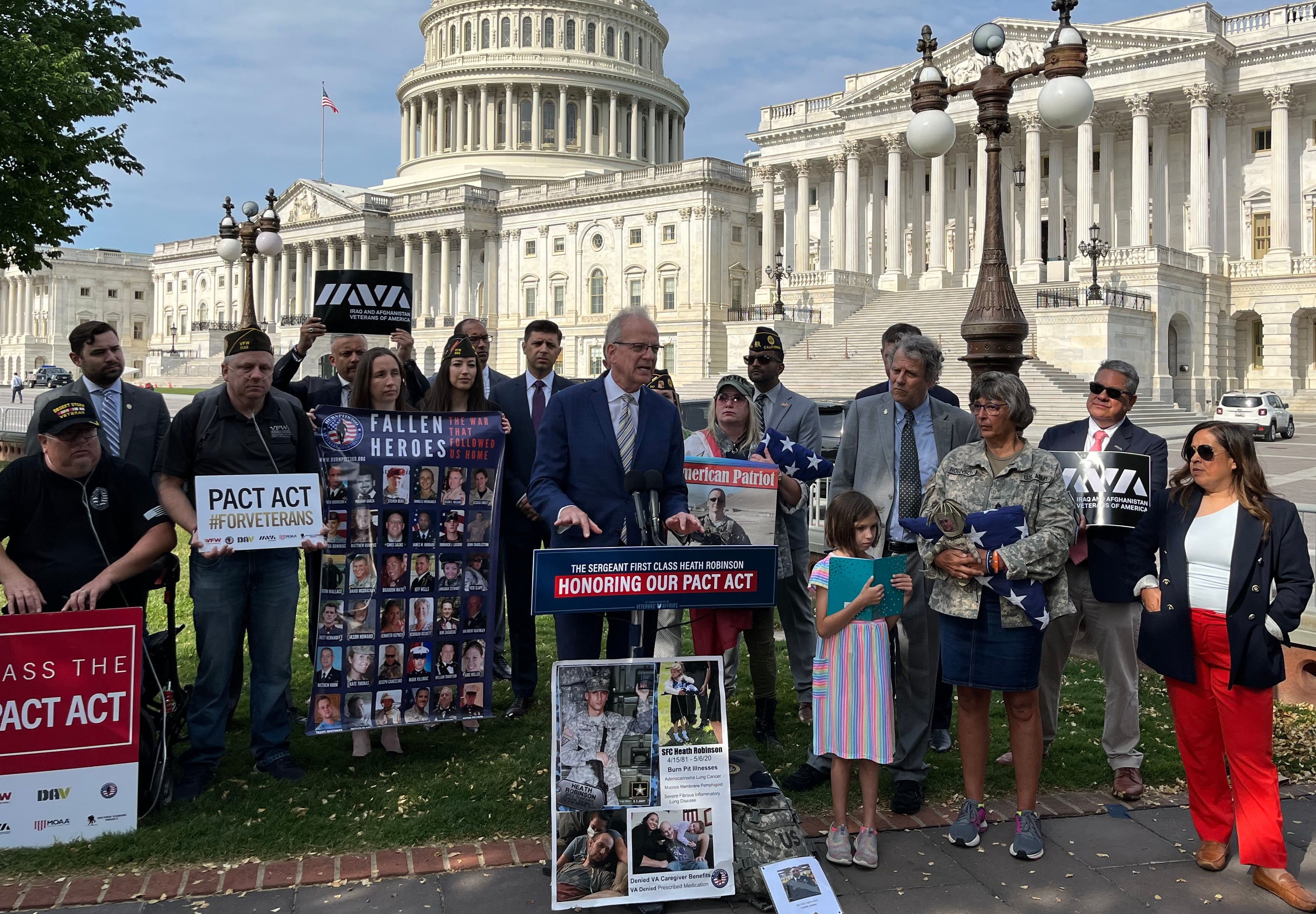The fate of over sweeping military toxic exposure legislation that could benefit millions of American veterans now hinges on a fight over government accounting methods and whether that’s actually Republican senators’ real concerns over the nearly $300-billion measure.
Senate Democrats are expected to bring up the Promise to Address Comprehensive Toxics Act, also known as the PACT Act, for another procedural vote on Monday afternoon. If they can get 60 votes for the action, the bill is likely to pass by the end of the week, and be signed into law by President Joe Biden a few days later.
Veterans advocates have been lobbying for the measure for years, saying it would dramatically expand benefits for veterans suffering illnesses from burn pit smoke, Agent Orange exposure, radiation poisoning and a host of other military toxic exposure events.
RELATED

The bill advanced on a 342–88 vote in the House two weeks ago with significant Republican support and was supported by 34 Republicans in the Senate during an 84–14 vote in June.
But last week, during a procedural cloture vote that was widely assumed only to be a formality, 25 Republicans flipped their vote to block the measure, saying they have newfound concerns with accounting issues that Democrats inserted into the measure.
New concerns?
The problem centers on how some benefits spending in the bill will be classified in federal budgeting procedures. Sen. Pat Toomey has led the charge, saying it could amount to billions in extra discretionary government spending over the next decade.
“If we change [the law] to the way that the Democrats want, it creates room in future budgets for $400 billion of totally unrelated, extraneous spending on other matters,” he said during an appearance on CNN’s State of the Union on Sunday. “That’s what I want to prevent.”
Toomey’s concerns are the same he raised in June, when he was one of the 14 senators who objected to the PACT Act’s final passage.
The bill has undergone minor technical changes since then. Several Republican senators who objected last week have justified their flip in recent days by insisting that Democrats only recently inserted the problematic issues into the bill, but the discretionary spending language provisions are the same as June, when the measure easily passed the Senate.
Veterans advocates have called the new messaging over the objections insincere.
“Twenty-five senators who voted for the PACT Act last month changed their vote on the exact same bill,” said Veterans of Foreign Wars National Commander Tim Borland in a statement. “[They] are risking more veterans getting sick and dying with every day this is delayed.”
RELATED

On Thursday, Sen. Chris Murphy, D-Conn., accused Republican senators of playing politics instead of really caring about the bill’s specifics. The failed PACT Act vote last week occurred just as Senate Democratic leaders announced the framework for new comprehensive health care and climate change legislation.
“The less charitable explanation is this: Republicans are mad that Democrats are on the verge of passing climate change legislation and have decided to take out their anger on vulnerable veterans,” he said.
Discretionary vs. mandatory spending
Both advocates and administration officials have also disputed Toomey’s concerns about the accounting issues.
In federal budgeting, spending classified as mandatory (which includes things like veterans benefits checks and Social Security payouts) is set in law and renewed annually. Discretionary spending, which includes program operations, can change each year depending on the whims of lawmakers.
Toomey has said he does not have concerns with categorizing the new benefits included in the PACT Act (about $279 billion over 10 years) as mandatory spending.
But he insists that provisions to move other existing toxic exposure benefits spending in the annual VA budget from the discretionary budget to the mandatory one opens up the door for budgetary gimmicks down the road.
“We are spending way too much money [in the federal budget],” he said. “To hide behind a veterans bill the opportunity to go on an unrelated spending spree is wrong.”
That theoretical spending would not be included in the PACT Act. But by reducing the total amount of discretionary spending in the non-defense side of the federal budget, future appropriators could have more flexibility to shift money into other non-veteran programs.
RELATED

After last week’s failed cloture vote, Senate Veterans Affairs Committee Chairman Jon Tester, D-Mont., blasted Toomey’s arguments baseless, saying that the normal appropriations process allows those kinds of debates each year.
And Veterans Affairs Secretary Denis McDonough on Sunday said requiring this block of veterans spending to remain in the discretionary budget would only endanger veterans’ benefits.
“The impact of [Toomey’s plan] is we may have to ration care for veterans,” he said on CNN. “The estimates he uses set caps on what we can invest in people.”
Senate Majority Leader Chuck Schumer, D-N.Y., said he will allow a vote on Toomey’s plan to change the accounting methods, but will require a 60-vote minimum for passage. Toomey has said he wants a simple majority vote, and floor time for other Republican amendments.
If the Senate amends the bill, it will need to go back to the House again for another vote before final passage. That likely wouldn’t happen until September, since the House began its summer recess on Friday.
If Monday’s planned vote simply fails again, the fate of the measure at any point this year is unclear. Toomey insisted that a compromise can be found, but offered no timeline for when that might happen.
The Senate is due back in for legislative business at 3 p.m. on Monday.
Leo covers Congress, Veterans Affairs and the White House for Military Times. He has covered Washington, D.C. since 2004, focusing on military personnel and veterans policies. His work has earned numerous honors, including a 2009 Polk award, a 2010 National Headliner Award, the IAVA Leadership in Journalism award and the VFW News Media award.





